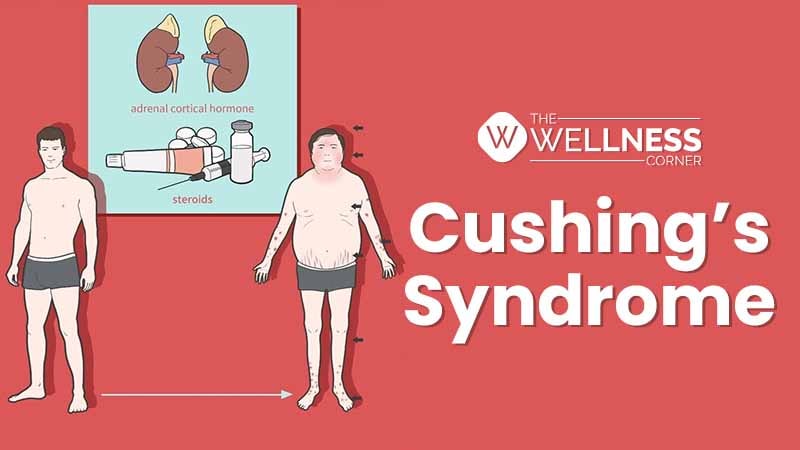Cushing’s Syndrome, the hidden reason behind Chronic Stress, Hypertension & Diabetes Mellitus
- 42 months ago
What is Cushing’s Syndrome?
Cushing’s Syndrome is a disorder in which the level of the hormone cortisol increases in the body. High cortisol causes weight gain around the abdomen, chest, face, and neck. Cushing’s Syndrome is a rare condition affecting around 10-15 out of one million people every year. It strikes adults between 20 and 50 years of age, but it can also occur in children. Cushing’s Syndrome is more prevalent in women than men, contributing to about 70 percent of all cases.
Causes of Cushing’s Syndrome
Cushing’s Syndrome is caused due to the following reasons:
Long-term use of corticosteroid medicines
People who take high doses of corticosteroid medicines for a long time may develop Cushing’s Syndrome. Corticosteroids are usually prescribed to treat rheumatoid arthritis, asthma and to prevent rejection after organ transplantation.
Excessive production of the hormone cortisol
Several medical conditions can trigger the adrenal gland to produce too much cortisol, including:
- Tumor in the adrenal gland.
- Tumor of the pituitary gland increases the secretion of adrenocorticotropic hormone (ACTH), causing the adrenal glands to release more cortisol.
- Tumors in the pancreas, lungs, or thyroid can increase the secretion of adrenocorticotropic hormone (ACTH).
Signs and symptoms of Cushing’s Syndrome
The symptoms of Cushing’s Syndrome may develop slowly or appear suddenly. Recognizing the symptoms of the disease at an early stage is necessary for the proper treatment, reducing the risk of severe complications.
Take a look at the common signs and symptoms of Cushing’s Syndrome-
- Weight gain around chest and abdomen with thin arms and legs
- A round face (moon face)
- Fat deposition on the neck and shoulders (buffalo hump)
- Thin skin that bruises easily
- Delayed wound healing
- Darker or purple stretch marks
- Muscle weakness
- Obesity and poor growth in children
- Unwanted hair growth in women
- Irregular menstrual periods
- Decreased fertility and low sexual desire in men
Cushing’s Syndrome can be the reason behind high BP, diabetes mellitus, and chronic stress. Cortisol hormone regulates a wide range of vital functions in the body. For example, it usually helps the body regulate metabolism, mobilize nutrients, control blood sugar levels, reduce inflammation, and respond to stress.
People with Cushing’s Syndrome have too much cortisol in the body. If not treated, the hormonal imbalance can cause health complications such as:
- High blood pressure or hypertension
- Insulin resistance and Type 2 diabetes mellitus
- Bone loss (osteoporosis)
- Chronic stress and depression
- Low muscle mass and strength
- Heart attack and stroke
- Infections
Cushing’s Syndrome treatment
Various treatment options are available for Cushing’s Syndrome, depending on the causes of high cortisol.
Tapering the doses of corticosteroids
If Cushing’s Syndrome is caused due to over-use of corticosteroids, your doctor will gradually reduce the dose of the medicine. The doctor will recommend the lowest possible dose of corticosteroids required to manage your disease.
Surgically removing a tumor
If Cushing’s Syndrome is caused due to a tumor in the adrenal glands, pituitary gland, lungs, or pancreas, your doctor will suggest surgery to remove a tumor. It will reduce the production of cortisol hormones in the body. But after the surgery, patients will require hormone replacement therapy to maintain the levels of cortisol.
Radiation therapy
The doctor recommends radiation therapy if a tumor can not be removed via surgery or if a patient is unfit for surgery. In radiation therapy, small doses of radiation are given for six weeks, or a high dose of radiation is given all at once to destroy the tumor cells.
Medications
The doctor may prescribe medications such as mitotane, metyrapone, and ketoconazole to reduce the production of cortisol. These medicines are used when other treatment options such as surgery and radiation therapy do not work.
After complete treatment, most patients observe improvements in the symptoms of Cushing’s Syndrome and recover fully.









